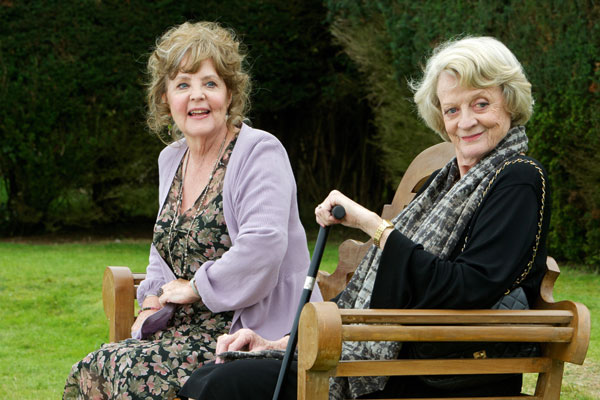You know how television is becoming like the movies, more expansive and more expensive? Well, what if the movies were to meet television halfway, becoming smaller and more routine? The result, I’m sure, would be something like Quartet, Dustin Hoffman’s first directorial effort since 1978’s Straight Time. If you ran past this film at speed, you could almost mistake it for an episode of Downton Abbey. It’s set in a country house. Maggie Smith is among its cast members. And it’s borrowed actors from small-screen series such as Gavin and Stacey and The Vicar of Dibley. Just the ticket for a lazy Sunday night in.
Except Quartet is not nearly so grand as Downton Abbey. The country house in question is a modern-day care home for retired musicians; and Smith’s character, Jean Horton, arrives there not as an imperious dowager, but as a faded opera star with an achy breaky heart and a please-don’t-breaky hip. Will she find some sort of happiness? I couldn’t possibly say. But it does just so happen that three of her old opera chums — Reg (Tom Courtenay), Cissy (Pauline Collins) and Wilf (Billy Connolly) — are also resident at the home. They performed together, decades before, in Verdi’s Rigoletto. And now the titular quartet has been reunited.
In the early scenes of Quartet, this set-up holds quite some promise. Everyone and everything, including the film itself, is caught up in a musical whirl. Strings are plucked, ivories are tickled, tunes are hummed, beats are tapped out, and lyrics are forgotten. And atop all of this is Connolly’s Wilf, making his own sort of music. It’s a role that is at once a departure and a natural fit for the Scottish comedian. He seems old, genuinely old and sometimes quite vulnerable, but he also has an endless stream of smutty chat-up lines. Exhibit A: ‘You have the nicest tits I have ever seen in my life.’
And it’s not just Connolly who gets to flex his acting muscles. Quartet contains one particularly wonderful scene in which Courtenay’s brooding character explains the joys of opera to a group of school kids who are visiting the home. ‘Opera is when a person is stabbed in the back…he sings,’ enthuses Reg. ‘The rise and fall of the music sets our emotions free.’ And, in return, one of the kids raps about rap. It’s the closest that the film comes to any sort of profundity. These old performers, it seems to say, have something to teach and something to learn. The interplay between generations needn’t be as antagonistic as it sometimes is.
But, with about a third of the film gone, it becomes clear that, despite its charm, all this is taking Quartet nowhere. Indeed, Connolly starts to seem like a scene-stealer; and not just in the usual, triumphant sense, but because his Wilf takes up more time, with his pissing and his gallivanting, than is strictly necessary. There is simply so much here that is divergence. Quartet proceeds as though it has a whole series, and many more episodes, to tell its story — whereas it actually has another half-hour.
And so, with no time left to let its drama unfold organically, Quartet just does it mechanically. In what seems like a panic, the plot is rushed out in throwaway dialogue between its players. We’re told, in rat-a-tat order, that Smith and Courtenay’s characters were once married; that she immediately had a fling with another opera singer, which she regards as the biggest mistake of her life; and that he’s still in love with her. It is about as perfunctory and unexciting as a checklist. And then, with the final box ticked (‘Let’s get married’ — who cares?), the film just ends.
I haven’t seen Ronald Harwood’s stage play, on which Quartet is based, so I don’t know whether these problems afflicted that too. But, in any case, my inclination would be to avoid being stung by the cold weather and the ticket prices. Far better to wait until Hoffman’s version is part of the Christmas television schedules in a couple of years. That way you can settle back into your sofa and some fine performances, fuel up on mulled wine, and forget it soon afterwards.






Comments